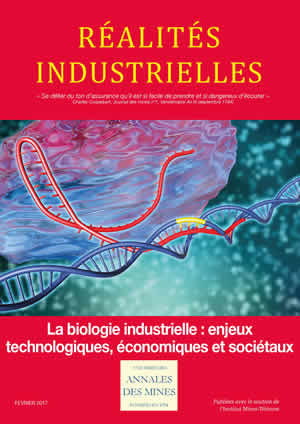| |

|
|
 Février 2017 - La biologie industrielle : enjeux technologiques, économiques et sociétaux Février 2017 - La biologie industrielle : enjeux technologiques, économiques et sociétaux
Understanding value chains in industrial biotechnology
By Jim PHILP
Conseiller Biotechnologies à DSTI/OCDE
Alain SCHIEB
Président de BACKCASTING SAS et consultant auprès de l’OCDE
and
Mohamed Majdi CHELLY
Ingénieur d’études à ENGIE Cofely France
Actual and future value chains regarding the industrial bioeconomy show that OECD countries will continue until 2050, at least, to be net importers of fossil fuels and also of biomass. In order to see a flourishing industrial bioeconomy in Europe, there is a need for competitive sources of biomass, including agricultural and forestry residues and waste materials. In principle, it should be easy to substitute local production in Europe to imports, given the size of demand. However, relative prices of fossil fuels versus renewable biomass will be a key to the growth of bio-sourced products in the European market. At present the competition is unwinnable: the fossil industries have a century of a head start and they still receive enormous subsidies. Creating a level playing field should be a pre-requisite for Europe. From a public policy perspective, creating a level playing field is both a high priority and a legitimate goal since it does not imply any selection by a government of a given technology pathway. The “technology neutral” requirement for public policies would be met while enforcing a level playing field that would still open the door for new entrants and particularly a circular and industrial bioeconomy.
 Télécharger gratuitement l'article Télécharger gratuitement l'article
 Retour au sommaire Retour au sommaire
 February 2017 - Industrial biology: the technological, economic and societal issues of biotechnology February 2017 - Industrial biology: the technological, economic and societal issues of biotechnology
Understanding value chains in industrial biotechnology
Jim Philp,
conseiller Biotechnologies à DSTI/OCDE,
Alain Schieb,
président de BACKCASTING SAS et consultant auprès de l’OCDE,
and
Mohamed Majdi Chelly,
ingénieur d’études à ENGIE Cofely France
Actual and future value chains regarding the industrial bioeconomy show that OECD countries will continue until 2050, at least, to be net importers of fossil fuels and also of biomass. In order to see a flourishing industrial bioeconomy in Europe, there is a need for competitive sources of biomass, including agricultural and forestry residues and waste materials. In principle, it should be easy to substitute local production in Europe to imports, given the size of demand. However, relative prices of fossil fuels versus renewable biomass will be a key to the growth of bio-sourced products in the European market. At present the competition is unwinnable: the fossil industries have a century of a head start and they still receive enormous subsidies. Creating a level playing field should be a pre-requisite for Europe.
From a public policy perspective, creating a level playing field is both a high priority and a legitimate goal since it does not imply any selection by a government of a given technology pathway. The “technology neutral” requirement for public policies would be met while enforcing a level playing field that would still open the door for new entrants and particularly a circular and industrial bioeconomy.
 Retour au sommaire Retour au sommaire
 Febrero 2017 - La biología industrial, desafíos tecnológicos, económicos y sociales Febrero 2017 - La biología industrial, desafíos tecnológicos, económicos y sociales
Understanding value chains in industrial biotechnology
Jim Philp,
conseiller Biotechnologies à DSTI/OCDE,
Alain Schieb,
président de BACKCASTING SAS et consultant auprès de l’OCDE,
and
Mohamed Majdi Chelly,
ingénieur d’études à ENGIE Cofely France
Actual and future value chains regarding the industrial bioeconomy show that OECD countries will continue until 2050, at least, to be net importers of fossil fuels and also of biomass. In order to see a flourishing industrial bioeconomy in Europe, there is a need for competitive sources of biomass, including agricultural and forestry residues and waste materials. In principle, it should be easy to substitute local production in Europe to imports, given the size of demand. However, relative prices of fossil fuels versus renewable biomass will be a key to the growth of bio-sourced products in the European market. At present the competition is unwinnable: the fossil industries have a century of a head start and they still receive enormous subsidies. Creating a level playing field should be a pre-requisite for Europe.
From a public policy perspective, creating a level playing field is both a high priority and a legitimate goal since it does not imply any selection by a government of a given technology pathway. The “technology neutral” requirement for public policies would be met while enforcing a level playing field that would still open the door for new entrants and particularly a circular and industrial bioeconomy.
 Retour au sommaire Retour au sommaire
|
|




